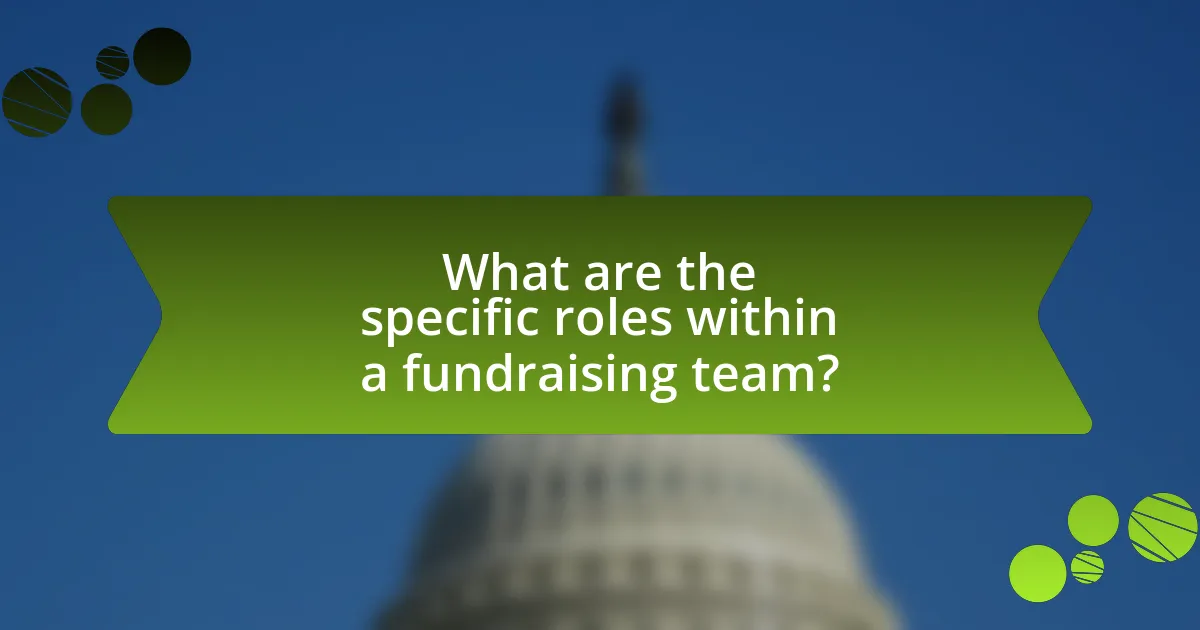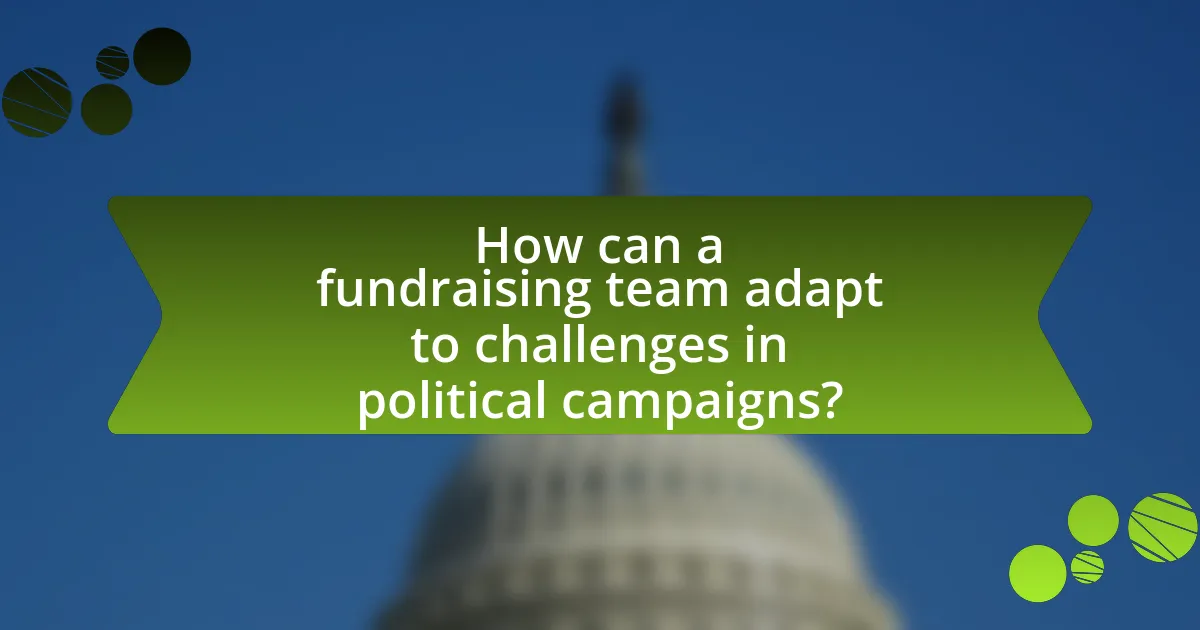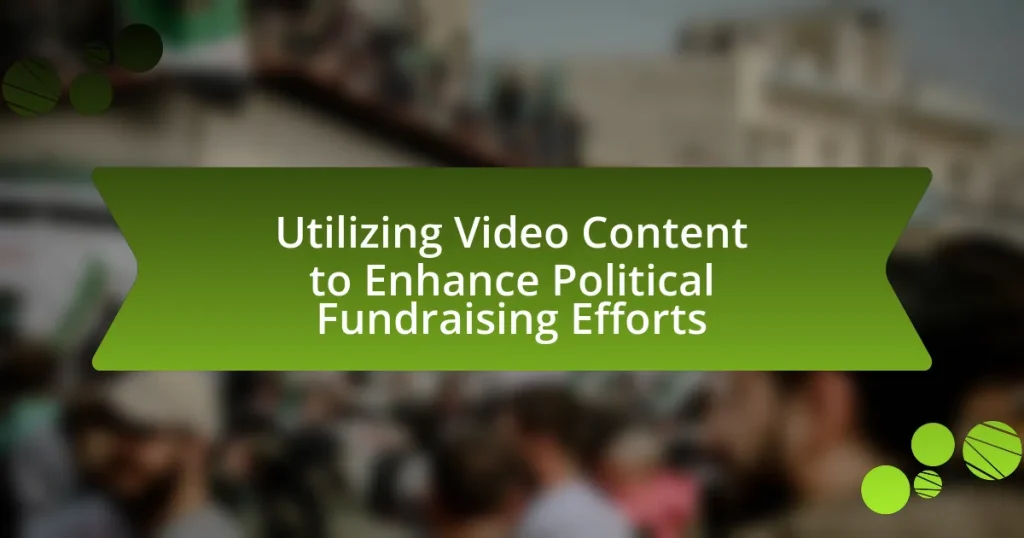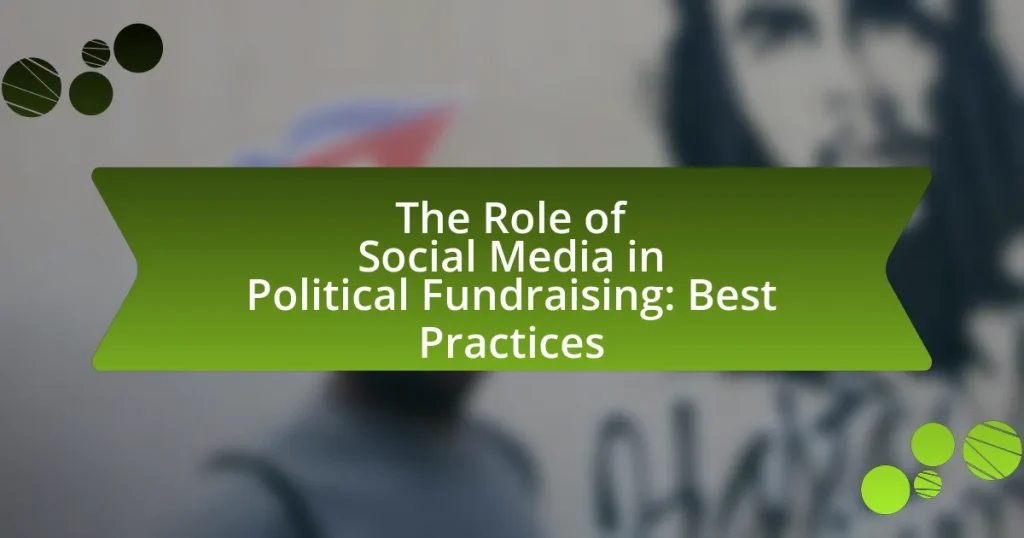Building a fundraising team for political campaigns is essential for generating financial support for candidates or political parties. This article outlines the roles and responsibilities within a fundraising team, including fundraising managers, event coordinators, donor relations specialists, and data analysts, each contributing to the campaign’s financial success. It emphasizes the importance of effective fundraising strategies, donor engagement, and compliance with legal regulations, highlighting how a well-structured team can significantly enhance a campaign’s ability to secure necessary funds. Additionally, the article discusses common challenges faced by fundraising teams and best practices to overcome these obstacles, ensuring sustained donor support and campaign viability.

What is Building a Fundraising Team for Political Campaigns?
Building a fundraising team for political campaigns involves assembling a group of individuals responsible for generating financial support for a candidate or political party. This team typically includes roles such as a fundraising manager, event coordinators, and donor relations specialists, each tasked with specific responsibilities to maximize contributions. For instance, a fundraising manager develops strategies to reach financial goals, while event coordinators organize fundraising events to engage potential donors. The effectiveness of a fundraising team can significantly impact a campaign’s success, as evidenced by the fact that campaigns with well-structured fundraising teams often raise substantially more funds than those without.
Why is a fundraising team essential for political campaigns?
A fundraising team is essential for political campaigns because it directly influences the financial resources available for campaign activities. Effective fundraising enables candidates to cover costs such as advertising, staff salaries, and event organization, which are crucial for reaching voters and promoting their message. According to the Center for Responsive Politics, in the 2020 U.S. elections, candidates who raised more funds were significantly more likely to win their races, demonstrating the correlation between fundraising success and electoral outcomes. Thus, a dedicated fundraising team is vital for ensuring that a campaign has the necessary funds to compete effectively.
What are the key objectives of a fundraising team?
The key objectives of a fundraising team include maximizing financial contributions, building donor relationships, and ensuring compliance with legal regulations. Fundraising teams aim to develop and implement strategies that effectively engage potential donors, thereby increasing the overall funding for political campaigns. For instance, according to the Association of Fundraising Professionals, successful fundraising relies on cultivating long-term relationships with donors, which can lead to increased contributions over time. Additionally, fundraising teams must adhere to campaign finance laws to maintain transparency and accountability, ensuring that all fundraising activities are conducted ethically and legally.
How does a strong fundraising team impact campaign success?
A strong fundraising team significantly enhances campaign success by ensuring adequate financial resources are available for strategic initiatives. This team is responsible for developing and executing fundraising strategies that attract donations, which directly correlates with a campaign’s ability to reach voters and promote its message effectively. Research indicates that campaigns with robust fundraising teams can raise up to 50% more funds than those without, allowing for increased advertising, outreach, and operational capabilities. Consequently, the presence of a skilled fundraising team not only secures necessary funding but also builds relationships with donors, fostering long-term support that can be crucial for both current and future campaigns.
What are the core components of a fundraising team?
The core components of a fundraising team include a fundraising manager, research analyst, donor relations specialist, and event coordinator. The fundraising manager oversees the entire fundraising strategy and ensures that goals are met, while the research analyst identifies potential donors and analyzes giving patterns to inform strategies. The donor relations specialist focuses on building and maintaining relationships with donors, ensuring effective communication and engagement. Lastly, the event coordinator organizes fundraising events, which are crucial for generating contributions and increasing visibility. These roles collectively enhance the effectiveness of fundraising efforts in political campaigns.
What roles are typically included in a fundraising team?
A fundraising team typically includes roles such as a Fundraising Manager, who oversees the entire fundraising strategy; Development Officers, responsible for cultivating donor relationships; Grant Writers, who prepare proposals for funding; Event Coordinators, who plan and execute fundraising events; and Data Analysts, who track and analyze fundraising performance. Each role contributes to the overall effectiveness of the fundraising efforts, ensuring that campaigns meet their financial goals and engage supporters effectively.
How do these roles interact to achieve fundraising goals?
Roles within a fundraising team interact through collaboration, communication, and strategic alignment to achieve fundraising goals. For instance, the campaign manager coordinates efforts among team members, ensuring that the fundraising strategist develops targeted messaging while the outreach coordinator engages potential donors effectively. This synergy is essential; research indicates that campaigns with well-defined roles and clear communication strategies raise 30% more funds than those without. By leveraging each member’s strengths, such as the finance director’s budgeting expertise and the volunteer coordinator’s ability to mobilize supporters, the team maximizes its fundraising potential and drives successful outcomes.
What skills and qualifications are necessary for fundraising team members?
Fundraising team members require strong communication skills, analytical abilities, and a solid understanding of fundraising strategies. Effective communication is essential for engaging potential donors and articulating the campaign’s mission. Analytical skills enable team members to assess fundraising data and identify trends, which is crucial for developing targeted strategies. Additionally, knowledge of fundraising techniques, such as grant writing and donor relations, is vital for success. According to the Association of Fundraising Professionals, successful fundraisers often possess a combination of interpersonal skills and technical expertise, which enhances their ability to secure donations and build lasting relationships with supporters.
What specific skills should a fundraising manager possess?
A fundraising manager should possess strong communication skills, strategic planning abilities, and financial acumen. Effective communication is essential for articulating the organization’s mission and engaging potential donors, as studies show that 70% of successful fundraising relies on clear messaging. Strategic planning skills enable the manager to develop and implement fundraising campaigns that align with organizational goals, while financial acumen is crucial for budgeting and analyzing fundraising performance. These skills collectively enhance the manager’s ability to drive successful fundraising initiatives in political campaigns.
How can volunteers contribute effectively to the fundraising team?
Volunteers can contribute effectively to the fundraising team by leveraging their networks to identify potential donors and organizing fundraising events. Engaging personal connections can lead to increased donations, as studies show that peer-to-peer fundraising can raise up to 10 times more than traditional methods. Additionally, volunteers can assist in creating promotional materials and social media campaigns, which can enhance outreach and visibility. Their involvement not only expands the team’s capacity but also fosters community engagement, which is crucial for successful fundraising efforts in political campaigns.
How can a fundraising team be structured for maximum effectiveness?
A fundraising team can be structured for maximum effectiveness by clearly defining roles, establishing a hierarchy, and ensuring collaboration among team members. Each member should have specific responsibilities, such as a team leader to oversee strategy, a data analyst to track donations, and outreach coordinators to engage potential donors. This structure allows for efficient communication and accountability, which are critical for achieving fundraising goals. Research indicates that organizations with clearly defined roles and responsibilities see a 30% increase in fundraising efficiency, as team members can focus on their strengths and work towards common objectives.
What strategies can be employed to enhance team collaboration?
To enhance team collaboration, implementing regular communication practices is essential. Establishing daily or weekly check-ins fosters transparency and keeps team members aligned on goals and tasks. Research indicates that teams with structured communication protocols experience a 25% increase in productivity, as reported by the Project Management Institute. Additionally, utilizing collaborative tools such as project management software can streamline workflows and facilitate real-time updates, further improving coordination among team members.

What are the specific roles within a fundraising team?
A fundraising team typically includes specific roles such as the Fundraising Manager, who oversees the entire fundraising strategy; the Grant Writer, responsible for researching and writing grant proposals; the Donor Relations Coordinator, who manages relationships with donors; the Event Coordinator, who plans and executes fundraising events; and the Data Analyst, who analyzes fundraising data to inform strategies. Each role contributes to the overall effectiveness of the fundraising efforts by focusing on distinct aspects of the process, ensuring that the campaign meets its financial goals.
What are the responsibilities of a fundraising manager?
A fundraising manager is responsible for developing and implementing fundraising strategies to secure financial support for political campaigns. This role includes identifying potential donors, cultivating relationships, and soliciting contributions. Additionally, the fundraising manager oversees fundraising events, manages budgets, and tracks fundraising progress to ensure targets are met. They also analyze data to refine strategies and report on fundraising outcomes to campaign leadership. These responsibilities are critical for the success of political campaigns, as effective fundraising directly impacts campaign viability and outreach efforts.
How does a fundraising manager coordinate team efforts?
A fundraising manager coordinates team efforts by establishing clear roles, setting specific goals, and facilitating communication among team members. This coordination involves creating a structured plan that outlines each member’s responsibilities, ensuring that tasks align with the overall fundraising strategy. Regular meetings and updates are implemented to track progress and address challenges, fostering collaboration and accountability. Evidence of effective coordination can be seen in successful campaigns where fundraising managers utilize project management tools to streamline tasks and enhance team engagement, leading to increased fundraising outcomes.
What metrics should a fundraising manager track?
A fundraising manager should track metrics such as total funds raised, donor retention rate, average donation size, and cost per dollar raised. Total funds raised provides a clear measure of fundraising success, while donor retention rate indicates the effectiveness of relationship-building efforts, with studies showing that retaining existing donors is significantly more cost-effective than acquiring new ones. Average donation size helps assess the impact of fundraising strategies, and cost per dollar raised measures the efficiency of fundraising efforts, with benchmarks suggesting that a cost of 20-30 cents per dollar raised is typical for effective campaigns.
What role does a donor relations specialist play?
A donor relations specialist is responsible for managing and nurturing relationships with donors to ensure their continued support for an organization. This role involves communicating with donors, acknowledging their contributions, and providing updates on the impact of their donations. The specialist also develops strategies to engage donors, including personalized outreach and recognition programs, which can lead to increased donor retention and higher levels of giving. Effective donor relations are crucial for fundraising success, as studies show that retaining existing donors is more cost-effective than acquiring new ones.
How does a donor relations specialist build and maintain relationships?
A donor relations specialist builds and maintains relationships by engaging in consistent communication, personalized outreach, and demonstrating appreciation for contributions. This specialist regularly updates donors on the impact of their gifts, ensuring they feel valued and informed. Research indicates that personalized communication, such as tailored thank-you notes and invitations to exclusive events, significantly enhances donor retention rates. For instance, a study by the Association of Fundraising Professionals found that organizations that actively engage with their donors see a 30% increase in long-term giving.
What strategies can be used to engage donors effectively?
To engage donors effectively, political campaigns should implement personalized communication strategies. Personalized outreach, such as tailored emails and direct phone calls, fosters a sense of connection and appreciation among donors. Research indicates that campaigns utilizing personalized communication see a 20% increase in donor retention rates compared to those using generic messaging. Additionally, regular updates on campaign progress and impact, along with exclusive donor events, enhance donor engagement by making them feel valued and involved in the campaign’s mission.
What is the importance of a data analyst in a fundraising team?
A data analyst is crucial in a fundraising team as they provide insights that drive strategic decision-making. By analyzing donor data, fundraising trends, and campaign performance metrics, the data analyst helps identify the most effective fundraising strategies and target demographics. For instance, a study by the Association of Fundraising Professionals found that organizations utilizing data analytics saw a 20% increase in fundraising efficiency. This demonstrates that the role of a data analyst not only enhances operational effectiveness but also maximizes fundraising potential through informed strategies.
How does data analysis inform fundraising strategies?
Data analysis informs fundraising strategies by providing insights into donor behavior, preferences, and trends. By analyzing historical donation data, campaigns can identify which demographics are most likely to contribute, allowing for targeted outreach efforts. For instance, a study by the Pew Research Center found that campaigns utilizing data analytics saw a 20% increase in donor engagement compared to those that did not. Additionally, data analysis helps in optimizing fundraising channels by revealing which methods yield the highest returns, enabling campaigns to allocate resources more effectively.
What tools can a data analyst use to enhance fundraising efforts?
Data analysts can enhance fundraising efforts by utilizing tools such as data visualization software, customer relationship management (CRM) systems, and predictive analytics platforms. Data visualization software like Tableau or Power BI allows analysts to present complex data in an easily digestible format, enabling stakeholders to understand fundraising trends and donor behaviors. CRM systems, such as Salesforce or HubSpot, help manage donor relationships and track interactions, which can lead to more personalized outreach and improved donor retention. Predictive analytics platforms, like Google Analytics or R, enable analysts to forecast future fundraising outcomes based on historical data, allowing campaigns to allocate resources more effectively. These tools collectively empower data analysts to make informed decisions that can significantly boost fundraising success.

How can a fundraising team adapt to challenges in political campaigns?
A fundraising team can adapt to challenges in political campaigns by employing flexible strategies and leveraging data analytics. By analyzing voter behavior and fundraising trends, teams can identify shifts in donor interests and adjust their outreach accordingly. For instance, during the 2020 U.S. elections, campaigns that utilized real-time data to pivot their messaging and target specific demographics saw a significant increase in contributions, demonstrating the effectiveness of data-driven decision-making. Additionally, diversifying fundraising methods, such as incorporating online platforms and virtual events, allows teams to reach a broader audience and mitigate the impact of in-person event restrictions.
What common challenges do fundraising teams face?
Fundraising teams commonly face challenges such as limited resources, donor fatigue, and competition for funding. Limited resources often result in insufficient staff and budget constraints, which hinder the team’s ability to execute effective fundraising strategies. Donor fatigue occurs when potential contributors become overwhelmed by frequent requests for donations, leading to decreased engagement and support. Additionally, competition for funding is intense, as numerous organizations vie for the same pool of donors, making it difficult for fundraising teams to secure necessary financial support. These challenges are well-documented in studies, such as the “Fundraising Effectiveness Project,” which highlights the impact of donor retention and competition on fundraising success.
How can teams overcome budget constraints?
Teams can overcome budget constraints by prioritizing resource allocation and leveraging cost-effective strategies. By identifying essential activities and focusing on high-impact fundraising efforts, teams can maximize their limited resources. For instance, utilizing digital platforms for outreach and engagement can significantly reduce costs compared to traditional methods. Research indicates that campaigns that effectively use social media and online fundraising tools can increase donations by up to 30%, demonstrating the potential for higher returns on investment with lower expenditures. Additionally, forming partnerships with local businesses and organizations can provide mutual benefits and shared resources, further alleviating financial pressures.
What strategies can be employed to address donor fatigue?
To address donor fatigue, organizations can implement strategies such as diversifying fundraising approaches, enhancing donor engagement, and providing transparent communication. Diversifying fundraising methods, including events, online campaigns, and peer-to-peer fundraising, can prevent monotony and keep donors interested. Enhancing donor engagement through personalized communication and recognizing donor contributions fosters a sense of belonging and appreciation, which can mitigate fatigue. Additionally, providing transparent updates on how donations are utilized builds trust and encourages continued support. Research indicates that organizations that maintain regular, meaningful contact with donors experience higher retention rates, demonstrating the effectiveness of these strategies in combating donor fatigue.
What best practices should fundraising teams follow?
Fundraising teams should follow best practices such as setting clear goals, building a diverse donor base, and maintaining transparent communication. Clear goals help teams measure success and adjust strategies effectively; for instance, a study by the Association of Fundraising Professionals indicates that organizations with specific fundraising targets raise 30% more than those without. A diverse donor base mitigates risk and enhances sustainability, as relying on a single source can jeopardize funding. Transparent communication fosters trust and encourages donor engagement, which is crucial for long-term relationships. These practices collectively enhance the effectiveness and efficiency of fundraising efforts in political campaigns.
How can transparency improve donor trust and engagement?
Transparency can significantly improve donor trust and engagement by providing clear and accessible information about how funds are utilized. When organizations openly share financial reports, project outcomes, and decision-making processes, donors feel more informed and valued, which fosters a sense of partnership. Research indicates that 85% of donors are more likely to support organizations that demonstrate transparency in their operations, as it reassures them that their contributions are making a meaningful impact. This level of openness not only enhances accountability but also encourages ongoing support and deeper engagement from donors, ultimately leading to stronger relationships and increased funding for future initiatives.
What role does storytelling play in fundraising success?
Storytelling plays a crucial role in fundraising success by creating emotional connections that motivate donors to contribute. Effective narratives engage potential supporters by illustrating the impact of their donations, making the cause relatable and urgent. Research indicates that campaigns utilizing storytelling can increase donor engagement and retention; for instance, a study by the Stanford Graduate School of Business found that stories can increase donations by up to 300%. This demonstrates that compelling storytelling not only captures attention but also drives financial support, making it an essential strategy in fundraising efforts for political campaigns.
What practical tips can enhance the effectiveness of a fundraising team?
To enhance the effectiveness of a fundraising team, establishing clear roles and responsibilities is essential. When each team member understands their specific duties, it leads to improved coordination and accountability. Research indicates that teams with defined roles are 30% more productive, as they can focus on their strengths and collaborate efficiently. Additionally, implementing regular training sessions on fundraising strategies and donor engagement can significantly boost team performance, as continuous learning equips members with the latest techniques and insights. Furthermore, utilizing data analytics to track fundraising progress and donor behavior allows the team to make informed decisions, optimizing their efforts for better results.



